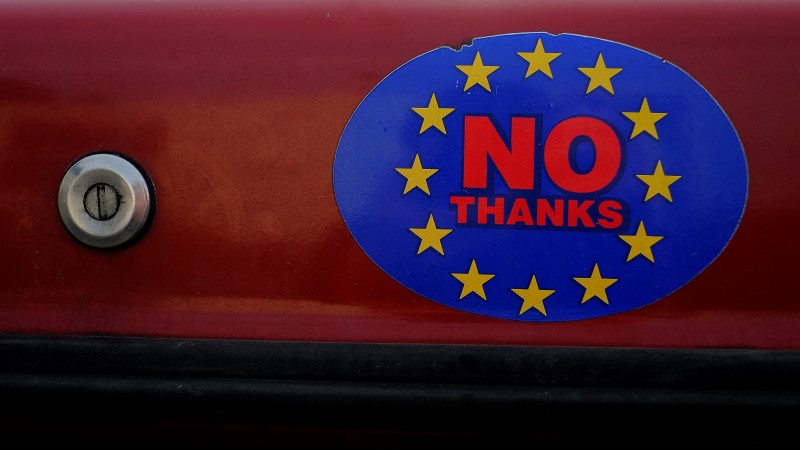By Ann Saphir
(Reuters) - Federal Reserve Chair Janet Yellen left U.S. interest rates unchanged on Wednesday, citing slow jobs gains, tepid growth and low inflation - and an impending vote in Britain on whether to quit the European Union.
"I think it’s fair to say that it was one of the factors that factored into today’s decisions," Yellen said of the "Brexit" vote next week. "Obviously how that turns out is something that will factor into future decisions."
It was not the first time global issues have played into Fed decisions on domestic monetary policy. Last fall the U.S. central bank deferred an expected rate rise after global markets swooned in response to an unanticipated slowdown in China's economy.
Britain's exit from the 28-member EU would add more uncertainty for Yellen's Fed as it seeks to re-establish its rate-setting credibility in the face of skeptical markets which have now all but priced out a rate rise by the U.S. central bank this year.
But beyond noting a Brexit could have "consequences for economic and financial conditions in global financial markets" that could in turn affect the U.S. economic outlook and the appropriate path of U.S. policy, Yellen gave few specifics on how she saw a UK departure from the bloc playing out.
Economists fear a "leave" vote could unleash turmoil on global financial markets. Traders in London are readying for all-nighters after polls close late on June 23.
Global exchanges say they will be on the lookout for disruptions.
The European Central Bank is prepared to pledge to backstop financial markets alongside the Bank of England.
And the Fed has standing swap agreements that would allow the BOE to buy sterling with dollars borrowed directly from the U.S. central bank under arrangements first used in response to the global financial crisis in 2008.
There are conflicting signals on how Britons will vote, with betting odds suggesting they will opt to stay in the EU, and some polls showing a "leave" decision will win out.
On Wednesday, however, even the reliably hawkish president of the Kansas City Fed, Esther George, agreed with her colleagues that rates should not rise. She did not say why, although some economists conclude she was swayed by Brexit uncertainty.
BREXIT RISK AVERSION TRANSLATES INTO RISING DOLLAR
The immediate concern to Fed officials is the potential market fallout, with the dollar expected to strengthen if the "leave" camp prevails. Sterling is the only major currency that has lost ground against the dollar so far in 2016, dragged down by a swing in opinion polls that indicate an "out" vote.
A rise in the dollar's value drags on U.S. exports and puts downward pressure on U.S. inflation, already well below the Fed's 2-percent target.
Last year the stronger dollar was a key reason the Fed deferred its rate hike as long as it did, until December.
Other effects are far more uncertain, but Britain runs a large trade deficit and is reliant on foreign inflows to finance it.
Just over half of economists polled by Reuters in April, for instance, said the Bank of England would probably respond by cutting rates to cushion the economy against a slowdown. The remainder, however, predicted a rate hike, perhaps to head off a rise in inflation set off by a plunge in sterling.

Analysts also worry a U.K. decision to leave the EU could spur other defections, unraveling one of the world's biggest economic blocs and hurting long term prospects for regional and world growth.